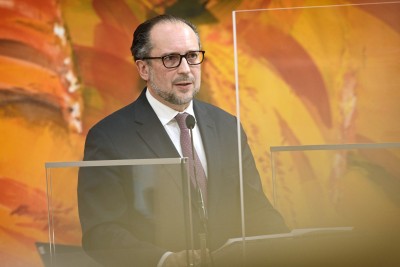Schallenberg on Russia's Aggression Toward Ukraine: "Dialogue where possible. Clear lines where necessary."
Foreign Minister Schallenberg gave a speech in the Austrian National Council in which he addressed the current tensions between Russia and Ukraine. Read what the foreign minister warned about the situation.
 Austrian Foreign Minister Alexander Schallenberg: "You can't negotiate with tanks and missiles." / Picture: © Parlamentsdirektion / Johannes Zinner
Austrian Foreign Minister Alexander Schallenberg: "You can't negotiate with tanks and missiles." / Picture: © Parlamentsdirektion / Johannes Zinner
Austrian Foreign Minister Alexander Schallenberg spoke in the National Council about the tense situation between Russia and Ukraine in view of the deployment of roughly 100,000 Russian troops on the Ukrainian-Russian border.
“This is a march that by no means falls into the ‘exercise’ category. Moscow has built up a massive threat. But you can't negotiate with tanks and missiles or–as Secretary of State Tony Blinken put it–‘with a gun to Ukraine's head,’” said Foreign Minister Schallenberg.
Schallenberg’s speech came just one day after U.S. President Joe Biden predicted that Vladimir Putin would invade Ukraine. During a press conference at the White House, Biden said, “My guess is he will move in.”
Schallenberg insisted that there can only be a solution through dialogue. He noted that it was, therefore, important that the diplomatic channels between the USA and Russia, between NATO and Russia, and within the framework of the Vienna-based OSCE ran hot last week.
“It is clear that large parts of the Russian demands cannot be met, such as legally binding guarantees that Ukraine will never join NATO. Every sovereign country has the right to decide its own security policy and to submit such an application for membership,” said Schallenberg.
He stated that, ultimately, only the alliance would decide on membership and not an uninvolved third country.
The Austrian foreign minister did say that other proposals should be used as a basis for further discussions.
He listed more arms control for conventional weapons, restrictions on the stationing of short- and medium-range missiles, greater transparency in military maneuvers, and more confidence-building measures, such as hotlines between the military, as potential areas for negotiations.
Schallenberg stated that serious negotiations need one thing above all: time. However, he acknowledged that time seems to be running out “because Russia keeps turning the spiral of escalation.”
“It seems as if we are already in the forecourt of the theater of war,” said Schallenberg, about the joint military maneuvers with Belarus, the threat of troop stationing in Venezuela and Cuba, and last week’s cyberattack on Ukraine.
At the informal meeting of foreign ministers in France, a very clear EU line was laid down.
Foreign Minister Schallenberg said, “We stand for negotiations, for dialogue. But never at the expense of our security or the sovereignty and independence of our partners. That corresponds perfectly with the line of the Austrian federal government because we have always said, ‘dialogue, wherever possible. Clear lines where necessary.’”
The foreign minister explained that Austria will continue to represent a strong, action- and solution-oriented EU position in Brussels, but any further aggression against Ukraine, on the other hand, would have massive consequences for Russia, both politically and economically.
“Our core message to Russia is unequivocal: Ukraine's sovereignty, territorial integrity and independence are under no circumstances part of the bargaining chip,” clarified Schallenberg.
As a sign of Central European solidarity, Schallenberg and his Czech and Slovak counterparts are traveling to Kiev and the contact line in the east at the beginning of February.



